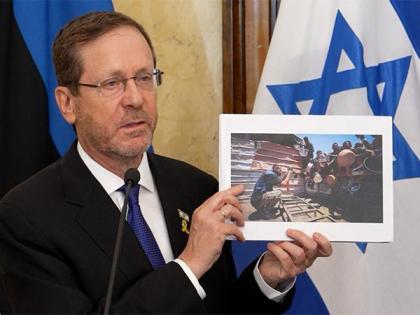Israeli President demands truth after German media exposes fake Gaza photography
By ANI | Updated: August 7, 2025 05:04 IST2025-08-07T04:58:31+5:302025-08-07T05:04:48+5:30
Tel Aviv [ Israel], August 7 (ANI/TPS): During a visit to Tallinn on Wednesday, President Isaac Herzog of Israel ...

Israeli President demands truth after German media exposes fake Gaza photography
Tel Aviv [ Israel], August 7 (ANI/TPS): During a visit to Tallinn on Wednesday, President Isaac Herzog of Israel used a joint press appearance with Estonian President Alar Karis to call out what he described as Hamas-led propaganda efforts, citing recent investigative reports from leading German newspapers that revealed staged images from Gaza. Herzog contrasted these fabricated scenes with the very real suffering of Israeli hostages, exposing what he called Hamas' "hypocrisy and manipulation."
Standing alongside President Karis at the Estonian Presidential Palace, Herzog held up two photos: one of Israeli hostage Eviatar David, a Nova music festival attendee now emaciated after months in captivity; and another of Rom Breslavsky, who appeared in a recent Hamas video. Herzog juxtaposed these with a now-controversial image from Gaza showing Palestinians holding empty pots in front of a food distribution center. "It was all staged," Herzog said. "There was food in the next room the hostages who escaped from tunnels told us this. The captors are not starving. Our people are."
His remarks follow revelations from the Suddeutsche Zeitung, which published an expose showing how Hamas uses staged imagery to sway international opinion. According to the investigation, professional photographers some working with international news agencies were found directing civilians to pose with empty pots and in fabricated scenarios meant to convey starvation. "At least some of the images were presented in a false or misleading context," the paper concluded.
One such photographer, identified by Bild as Anas Zayed Fatiyeh, was hired by Turkey's state-run Anadolu Agency. Fatiyeh, according to the report, regularly posts anti-Israel content on social media, including expletive-laden messages and calls to "Free Palestine." His photographs have been published in major outlets such as the BBC and CNN despite their questionable authenticity.
"Why are German and international news agencies continuing to use his images when many are clearly biased or staged?" Bild asked.
The manipulation of war photography triggered alarm within Germany's press circles. The German Journalists' Association (DJV) issued a statement warning of "manipulation attempts through professionally produced press photography." DJV Chair Mika Beuster noted that "all parties involved in this war including media and intelligence services are using the power of imagery like never before to shape public perception."
A historian and visual documentation expert interviewed by Suddeutsche Zeitung added that while not all such images are outright fakes, they are often "positioned a certain way or paired with misleading captions that tap into our visual memory and emotions."
Herzog urged the international community to resist falling for such distortions. "We do not deny the humanitarian need in Gaza," he said, "but we ask the world not to fall for Hamas' lies. Condemn Hamas and tell them: You want to move forward? Release the hostages."
He emphasized that Israel has drastically increased its humanitarian aid efforts, saying, "In the last week alone, we've brought in 30,000 tons of aid 30 tons by air yesterday alone. The UN has almost 800 trucks they could distribute and failed to do so. So a lot could have been done."
A special report by The Press Service of Israel on Thursday found that according to the UN's own numbers, a staggering 85% of the aid entering the Gaza Strip by truck since May 19 has been stolen. The investigation found that a combination of black market profiteers and inflation have made much of the aid in Gaza markets unaffordable for most Palestinians.
Palestinian sources inside Gaza told TPS-IL that much of the food in the markets originated from international aid for months including American shipments but is resold at inflated prices, sometimes 300%. Basic staples like flour and rice, originally meant for free distribution, are reportedly diverted to private vendors.
One Palestinian in Gaza City told TPS-IL, "The flour when it enters Gaza, they steal it. And now they're going to raise the price from 30 to 60 shekels [$8.80 to $17.70]. It's unbelievable."
Professor Eytan Gilboa an expert in international relations and media at Reichman University in Herzliya, told TPS-IL, "There is some hunger in Gaza, and it exists only in places Hamas is pursuing it, not in other areas."
In 2024, experts told TPS-IL that two Gaza-based Palestinian freelance photojournalists comitted war crimes by entering Israel during Hamas's October 7 massacres.
HonestReporting, a Jerusalem-based media watchdog, found that freelance photographers Mohammed Fayq Abu Mostafa and Ashraf Amra entered Israel to photograph the attacks. They then returned to Khan Yunis and went on Amra's Instagram Live account and excitedly shared a video of a mob pulling an Israeli soldier out of a tank, urging Palestinians to join the attack. Mostafa's photos were published by Reuters while Amra's were credited to "Ashraf Amra/Anadolu Agency via Getty Images."
Approximately 1,200 people were killed, and 252 Israelis and foreigners were taken hostage in Hamas's attacks on Israeli communities near the Gaza border on October 7. Of the 50 remaining hostages, around 30 are believed to be dead. (ANI/TPS)
Disclaimer: This post has been auto-published from an agency feed without any modifications to the text and has not been reviewed by an editor
Open in app